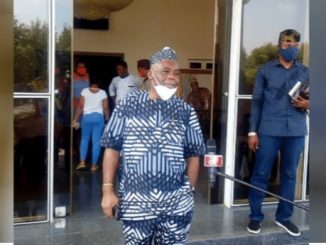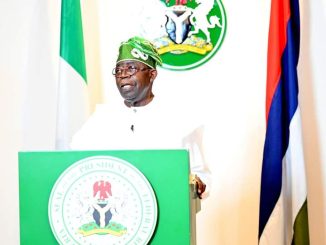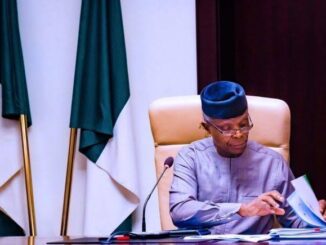
• Says Nigeria on positive growth trajectory but cultural, demographic hurdles affect development
By Marvellous Nyang
May 24, 2024
In an electrifying revelation that may reshape political narratives, former All Progressives Congress (APC) National Secretary, Senator Iyiola Omisore, has peeled back the layers of secrecy surrounding the historic ascension of former Lagos governor, Asiwaju Bola Tinubu, as the party’s presidential candidate.
Two years since Tinubu’s landmark victory, Omisore’s disclosure unveils the gripping intrigues and intense power struggles that defined the pivotal moment in Nigeria’s political landscape.
Behind-the-scenes of APC’s historic moment
Giving the revelation that illuminates the events surrounding Tinubu’s emergence as the APC candidate on June 8, 2022, in an enlightening interview on Channels TV’s popular talk show, “Inside Sources with Laolu Akande,” on Friday, May 24, the mathematician and former Osun State Deputy Governor, provided a glimpse into the behind-the-scenes dynamics of the APC presidential primaries.
Confirming the intricate power plays within the party, Omisore disclosed, “In politics, everybody has their mindsets. We came from different (geopolitical) zones to the NWC (National Working Committee) at that time, representing differing interests.”
He explained the divergent mandates peculiar to various party members, stating, “I was the most senior member of the party in the South-West and my mandate was to deliver South-West for Presidency.”
Reflecting on the contentious period preceding the primaries, Omisore recounted the tug-of-war between party factions backing different aspirants, notably, he highlighted the disagreement between the then APC National Chairman, Abdullahi Adamu, and a league of northern governors who championed Bola Tinubu as the party’s preferred candidate.
Recalled in the buildup to the APC presidential primary in June 2022, Adamu had announced the then Senate President, Ahmad Lawan, as the party’s “consensus candidate” but the announcement was strongly rejected by a league of northern governors who preferred Tinubu.
Divulging party dynamics
Directly quoting Omisore’s assessment of the primary process, he stated, “Everything that happened in the buildup to the APC presidential primary was ‘all political.’ Whatever we did then was for that time.”
He emphasised the importance of transparency in the primary process, noting that democracy thrived when choices were respected, adding, “We voted, everybody had a choice and it was transparent,” he added.
Omisore also shed light on the strategies employed by different party members during the primaries, stating, “My mission was to deliver the South-West for Presidency which we are today. So, my own was to get to my destination which I have gotten to today. The way and manner I did my journey is between me and God. I can’t castigate anybody who tried to be smart but if you want to be smart and I outsmarted you, to God be the glory.”
Despite the intense competition and intra-party squabbles, Omisore affirmed Tinubu’s resounding victory in the primary elections, as he won the keenly contested primary, trouncing strong contenders like Lawan, ex-Transport Minister Rotimi Amaechi, and former Vice President Yemi Osinbajo, amongst others.
Omisore in the exclusive interview provides invaluable insights into the intricate dynamics of APC’s internal politics and the pivotal role played by key stakeholders, culminating in Tinubu’s emergence as the party’s presidential flag bearer.
Also in the riveting interview, former Osun State Deputy Governor, Omisore, asserted that while President Bola Tinubu’s first year in office has positioned Nigeria on a positive growth trajectory, he said cultural and demographic hurdles continue to impede the country’s development, while highlighting both the achievements and ongoing challenges facing the nation, among other burning national issues.
Achievements under Tinubu administration
Senator Omisore praised President Tinubu’s administration for setting Nigeria on a positive growth path, saying, “In one year of President Bola Tinubu in power, Nigeria is positioned on a positive growth trajectory.”
He highlighted the administration’s bold economic policies, including the removal of petroleum subsidies, as necessary steps toward long-term financial stability.
ALSO READ: APC: Omisore and the shape of things to come
Omisore said, “Every party that contested had petroleum subsidy removal as their major manifesto. So how come it has become an issue? This issue of he shouldn’t have done it this way is a matter of semantics. This thing must still go because we are losing so much money.”
The former Senator representing Osun East in the Nigeria Senate from 2003 to 2011, also defended the President’s decisive actions in governance, saying, “Now we are in a new government headed by Asiwaju Bola Tinubu. He has taken some strong strides. And for leadership, you must make bold moves. When you take bold strides in leadership, people will be complaining, they will be making noise. After the end of tenure, people will appreciate it.”
Cultural attitude impacting progress
However, Omisore identified cultural attitudes as a significant barrier to Nigeria’s progress, pointing out that societal behaviours, such as the tendency to hoard resources during distributions, as undermining government efforts.
“Our culture, our perspective, our reasonability, our upbringing, and our training sometimes negate helping the government. In some other advanced countries, let’s say Egerton Road to Newtown via Manor Drive, UK, they have a much better welfare package than anybody in the world but they are as well disciplined and poised towards honesty. You are coming from Egerton Road to Newtown via Manor Drive, UK, you take one loaf of bread, one sardine and two bags of semovita, they will just take and go away. But our people here will go and re-queue and re-queue.”
He further explained, “Even in a common meeting at home, political setting or when you are hosting our people at the grassroots, you have prepared food for a hundred people and only fifty of them are available, they will still be rushing so that they can take two or three to take home. Sometimes it is poverty too, fear of not being sure of tomorrow.”
Omisore emphasised the need for cultural shifts, stating, “We need to address these cultural attitudes if we want to progress as a nation. It’s not just about government policies; it’s about changing mindsets and behaviours at the grassroots level.”
Demographic challenges and infrastructure strain
Addressing Nigeria’s rapid population growth, Omisore noted that the demographic expansion poses severe challenges to infrastructure and resource management.
“Our population is growing at a geometrical progression, while other nations grow at an arithmetical progression. Unfortunately for us in this country, our population is growing at geometrical progression, other nations grow at arithmetical progression but ours is growing geometrically,” Omisore noted.
This disparity, he argued, strains existing resources, such as the national power grid, which has not expanded adequately to meet growing demand. “We have 7000 megawatts of transmission lines from about five to six years ago, and it’s now insufficient for our growing needs,” Omisore said.
He further elaborated on the importance of accurate data for planning, “There is the issue of data, statistics versus religion too. People don’t want to be counted, they don’t want you to count their children. They will be afraid to tell you thinking maybe you want to kill their children. Whereas, this helps to plan. Where there is no data, there is no plan basically.”
Poverty and government initiative
Omisore who once served as the Chairman of the Appropriation Committee in the Senate, acknowledged the persistent issue of poverty but commended the government’s efforts to address it.
He highlighted several initiatives, including the Ministry of Humanitarian and Poverty Alleviation and various direct payment programmes. “This government is making so many efforts, SERAP, humanitarian affairs, payment directly to credit, student loan board, consumer credit facility. These are solutions to solve poverty.”
He further added, “But you know during the time of President Buhari. starting from the social enterprise headed by Vice President Yemi Osinbajo. And now, he even created the Ministry of Humanitarian and Poverty Alleviation which means the government is struggling to meet up with the challenges of poverty.”
He stressed the need for public cooperation in combating poverty, “The issue now is that the public, are you ready to cooperate with the government? Our culture, our perspective, our reasonability, our upbringing and our training sometimes negate propagating helping the government,” Omisore said.
Steady progress amid challenges
Despite the hurdles, Omisore expressed optimism about Nigeria’s steady progress. He highlighted the uninterrupted democratic transitions since 1999 as evidence of positive development.
“The fact that we are transiting from one government to another means that we are making progress. Up till 1983, it has been termination, military coup d’etat in between connections. And there is nothing like democracy. The best military regime is not as good as democracy because military regimes are dictatorships across the line. You will be suffering in silence,” the Ile-Ife-born politician said.
While acknowledging that progress might be slower than expected, he emphasised that the country is moving in the right direction. “We are developing arithmetically, and the population is growing geometrically. That is the mathematical balance.”
Omisore called for greater public cooperation and discipline to help bridge the gaps created by cultural and systemic issues, charging, “Be your neighbour’s keeper. The moment you take more than yours, you are impairing other people. You are spreading poverty.”
He stressed that individual actions play a crucial role in national development and that societal cooperation is essential for effective policy implementation, adding, “Government can only try much at the policy level, there are the implementors and beneficiaries. Those levels down are the gaps too.”
Concluding, he urged citizens to embrace a collective responsibility towards nation-building, stating, “We need to cultivate a culture of accountability and cooperation. Each of us has a role to play in shaping the future of our country.”




